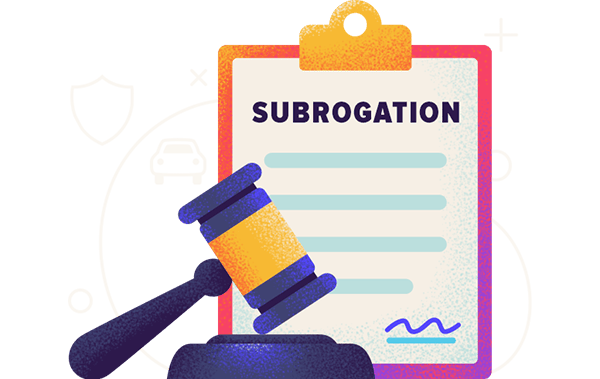What Is Subrogation in Car Insurance?
Subrogation is the process that allows your insurer to recoup costs from the at-fault driver’s insurance company for expenses paid after an accident. Subrogation makes it possible for a driver to receive a payout for an insurance claim before the insurance companies agree on who was at fault.
Key Takeaways About Subrogation
- The definition of subrogation is the legal right of one party to collect damages or debt originally owed to another entity by a third party.
- Car insurance subrogation allows the at-fault driver’s insurance company to compensate the other driver’s insurance company for any claims they paid.
- Policyholders benefit from subrogation, since it keeps premiums low for good drivers and helps insurance companies pay claims quickly.
- A waiver of subrogation is an agreement not to collect funds from the at-fault party. Drivers should always consult their insurance company before signing one.
When Does Subrogation Occur?
Subrogation occurs when you get into an accident caused by another driver and your insurer decides to recoup the money they paid you to take care of your accident-related injuries and vehicle repairs from the at-fault driver’s insurance company. You don’t have to pay anything back. Your insurer may pursue subrogation when you are not at fault or partially not at fault.
Continue reading to learn more about how subrogation works, its benefits, and when it can occur.
How Does Subrogation Work?
Subrogation takes place between insurance companies, so drivers themselves are usually not involved. Your involvement with the subrogation process is more administrative in nature, though what you can expect from the process may vary depending on whether you are at fault.
What to Expect During Subrogation When You Are Not At Fault
If your insurance company is filing a subrogation claim against the at-fault driver or their insurer, you won’t have much involvement in the process. But there are a few things you should be aware of, as they could affect your options.
Your insurer must inform you. You will receive a letter from your insurer, notifying you that they are attempting to recoup the costs from your claim through subrogation. If you do not receive any notification that your insurer is beginning a subrogation claim, you have the legal right to sue the at-fault driver to recover any deductibles or costs not covered by your insurance.
You could get your deductible back. Your insurance company must inform you if they are going to subrogate your claim. If they do, any deductible you paid must be part of the amount your insurance company seeks to recover. If your insurance company does not pursue subrogation, you can sue the at-fault party on your own to seek reimbursement for your deductible.
You may be limited on what you can agree to. Under many insurance contracts, after you file a claim, you are not allowed to take any action that would negatively affect your insurance company’s right of recovery of funds, such as signing an agreement with the at-fault driver that releases him or her from liability in exchange for a payment.
In a situation where the other driver is completely at fault and has adequate insurance, subrogation can be pretty simple. But you may find yourself in a more complicated situation. We outline how subrogation might work in some of these cases in the sections below.
What to Expect During Subrogation When You Are At Fault
If you are the at-fault driver in a subrogation claim, your insurer will handle the process itself. However, if you do not have insurance and are at fault, you can be sued directly by the victim or their insurance company.
Learn more about how subrogation works.
Benefits of Subrogation
Quick Claim Payouts. Your insurance company is more likely to pay bills quickly when they are confident they will recover some or all of their costs.
Lower Premiums. Subrogation helps keep your premiums down, since it shifts costs back to the at-fault driver and his or her insurer.
Less Hassle. Subrogation provides a buffer between you and the potential headaches, paperwork, and costs of a lawsuit, mediation, or some other dispute settlement process.
Saves Insurers Money. Subrogation helps insurance companies recover a significant portion of the money they pay out in claims. Insurers typically recoup $1 for every $5 paid out for property damage claims, according to data from the National Association of Insurance Commissioners.
For most people, the main benefits of subrogation in car insurance are lower premiums and not having to wait months, or even years, for fault to be determined and claims to be paid out after an accident. Subrogation allows your insurance company to pay before fault is determined without risking losses if you’re found to be not at fault. If necessary, they can simply recover those costs from the at-fault driver’s insurer once fault is later determined.
Subrogation Examples
Uninsured Drivers
If an at-fault driver is not insured, you may be able to cover your expenses using your own collision or uninsured motorist insurance. Your insurance company may subsequently sue that driver directly for reimbursement of their costs and your deductible. Since they’re suing an individual, not negotiating with an insurance company, this can be a longer process that’s less likely to recover funds.
Both Drivers Are at Fault
Depending on the laws of your state, if you and another driver are both at-fault, you and your insurer may be able to recover part of your costs through subrogation in proportion to your degree of fault. For example, if the other driver is found to be 60% at-fault for the accident, your insurer is only able to recoup 60% of the costs they paid to you, since you were still 40% at-fault.
Partial Recovery
In some instances, your insurance company may only be able to recover 50% of the loss from the at-fault driver. This is considered a partial recovery, and the recouped costs will be divided between you and your insurance company to reflect the percentages of money paid to repair your car. The recovered costs are divided based on the ratio between your deductible and the amount of money your insurer paid to repair your car.
See more detailed examples of subrogation.
How Long Does Subrogation Take?
Subrogation takes six months, on average, though it can take longer depending on the complexity and severity of the accident in question. Subrogation usually takes longer when it involves accidents with multiple vehicles, bodily injury claims, or incidents where fault is difficult to determine.
What Is a Waiver of Subrogation?
A waiver of subrogation is an agreement that prevents your insurance company from going after the at-fault party for reimbursement. Typically, an at-fault driver will propose a waiver when he or she wants to settle with you directly.
Not all car insurance policies will allow you to waive subrogation, and many will require you to notify your insurer before signing any waiver. Make sure you understand the provisions of your own insurance policy before signing anything.
Learn more about waivers of subrogation.



WalletHub experts are widely quoted. Contact our media team to schedule an interview.